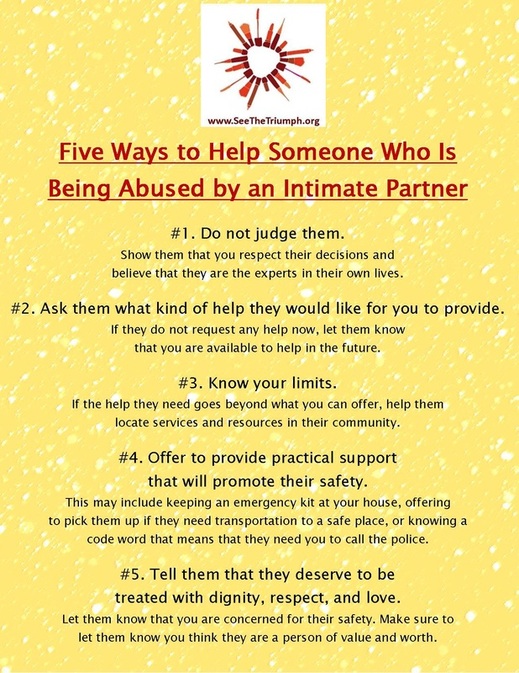|
By Christine Murray, See the Triumph Co-Founder
What can you do to help someone in an abusive relationship become more safe? As I’ve discussed in the first 3 blogs in this series, important considerations in answering this question for a person in your life are:
At the most basic level, safety planning means identifying potential safety risks and actively and intentionally planning ways to reduce the risks they present. Of course, there is no absolute way to guarantee safety when there’s an abusive partner in the picture. However, through some basic safety planning, a survivor can develop practical strategies to promote their own safety and minimize the risks they face. Although Safety Strategies was designed to be used by professionals, it contains several examples of the types of safety strategies that can be used to address some of the major risks that survivors face in abusive relationships. We learned about these risks and the strategies to address them in the focus groups we conducted. Based on the Safety Strategies Guidebook, the following actions are examples of the general strategies that could potentially be used to help promote safety in the context of the some of the risks involved in an abusive relationship. The word potentially is important to highlight, as each person’s situation is unique, so it’s important to consider whether each particular strategy would be relevant, safe, and appropriate for each person. Risk: Leaving an abusive relationship Sample safety strategies:
Sample safety strategies:
Risk: Keeping children safe in the context of parents’ abusive relationships Sample safety strategies:
Sample safety strategies:
Risk: Enforcing a domestic violence protection/restraining order Sample safety strategies:
Sample safety strategies:
When it comes to supporting someone in an abusive relationship, remember this: Think Safety First! There are many practical steps that you can support your friend in taking to increase their safety and address many of the risks they face. By helping your friend identify these steps, you can help them to feel empowered to know that, even within their abusive relationship, they have options and can take action to become safer.
0 Comments
Leave a Reply. |
Archives
July 2024
CategoriesAll About Intimate Partner Violence About Intimate Partner Violence Advocacy Ambassadors Children Churches College Campuses Cultural Issues Domestic Violence Awareness Month Financial Recovery How To Help A Friend Human Rights Human-rights Immigrants International Media Overcoming Past Abuse Overcoming-past-abuse Parenting Prevention Resources For Survivors Safe Relationships Following Abuse Schools Selfcare Self-care Sexual Assault Sexuality Social Justice Social-justice Stigma Supporting Survivors Survivor Quotes Survivor-quotes Survivor Stories Teen Dating Violence Trafficking Transformative-approaches |
Search by typing & pressing enter



 RSS Feed
RSS Feed